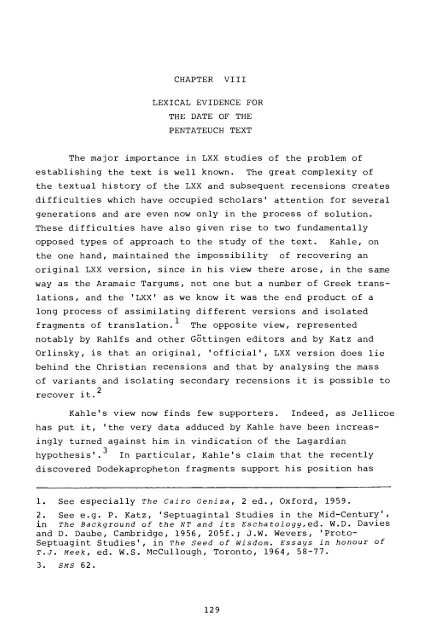A Lexical Study of the Septuagint Version of the Pentateuch
A Lexical Study of the Septuagint Version of the Pentateuch
A Lexical Study of the Septuagint Version of the Pentateuch
Create successful ePaper yourself
Turn your PDF publications into a flip-book with our unique Google optimized e-Paper software.
CHAPTER VIII<br />
LEXICAL EVIDENCE FOR<br />
THE DATE OF THE<br />
PENTATEUCH TEXT<br />
The major importance in LXX studies <strong>of</strong> <strong>the</strong> problem <strong>of</strong><br />
establishing <strong>the</strong> text is well known. The great complexity <strong>of</strong><br />
<strong>the</strong> textual history <strong>of</strong> <strong>the</strong> LXX and subsequent recensions creates<br />
difficulties which have occupied scholars' attention for several<br />
generations and are even now only in <strong>the</strong> process <strong>of</strong> solution.<br />
These difficulties have also given rise to two fundamentally<br />
opposed types <strong>of</strong> approach to <strong>the</strong> study <strong>of</strong> <strong>the</strong> text. Kahle, on<br />
<strong>the</strong> one hand, maintained <strong>the</strong> impossibility <strong>of</strong> recovering an<br />
original LXX version, since in his view <strong>the</strong>re arose, in <strong>the</strong> same<br />
way as <strong>the</strong> Aramaic Targums, not one but a number <strong>of</strong> Greek trans<br />
lations , and <strong>the</strong> 'LXX' as we know it was <strong>the</strong> end product <strong>of</strong> a<br />
long process <strong>of</strong> assimilating different versions and isolated<br />
fragments <strong>of</strong> translation. 1<br />
The opposite view, represented<br />
notably by Rahlfs and o<strong>the</strong>r Göttingen editors and by Katz and<br />
Orlinsky, is that an original, '<strong>of</strong>ficial', LXX version does lie<br />
behind <strong>the</strong> Christian recensions and that by analysing <strong>the</strong> mass<br />
<strong>of</strong> variants and isolating secondary recensions it is possible to<br />
recover it.<br />
Kahle's view now finds few supporters. Indeed, as Jellicoe<br />
has put it, '<strong>the</strong> very data adduced by Kahle have been increasingly<br />
turned against him in vindication <strong>of</strong> <strong>the</strong> Lagardian<br />
3<br />
hypo<strong>the</strong>sis'. In particular, Kahle's claim that <strong>the</strong> recently<br />
discovered Dodekapropheton fragments support his position has<br />
1. See especially The Cairo Geniza, 2 ed., Oxford, 1959.<br />
2. See e.g. P. Katz, '<strong>Septuagint</strong>al Studies in <strong>the</strong> Mid-Century',<br />
in The Background <strong>of</strong> <strong>the</strong> NT and its Eschatology,ed. W.D. Davies<br />
and D. Daube, Cambridge, 1956, 205f.; J.W. Wevers, 'Proto-<br />
<strong>Septuagint</strong> Studies', in The Seed <strong>of</strong> Wisdom. Essays in honour <strong>of</strong><br />
T.j. Meek, ed. W.S. McCullough, Toronto, 1964, 58-77.<br />
3. SMS 62.

















